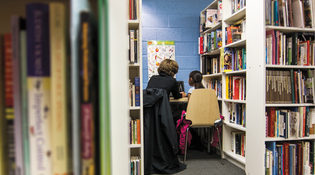 loading
loading
New HavenNew Haven reads… and reads… and readsHow a little book bank became a big tutoring operation.  Mark Zurolo '01MFAView full image“I found like ten more horse books,” a girl said to her friend, with glee. “I’ve got a night book,” a little boy told his teacher. “Thank you for letting me have this pirate book,” another child said to a volunteer as he put on his coat to leave. These second graders from Ridge Hill School, in Hamden, were on a field trip to New Haven Reads, a free book bank and tutoring service in New Haven’s Dixwell neighborhood not far from Payne Whitney Gymnasium. Each left with five books, and a lot of news to share about the visit. Now in its 12th year, New Haven Reads was founded by the late Christine Alexander, wife of Bruce Alexander ’65, Yale’s vice president for New Haven and state affairs and campus development. Its goal is to promote literacy by sharing free books and providing literacy services. In a city where only 33 percent of third graders read at or above grade level, and almost a third of city children live in poverty, the rapid growth of New Haven Reads suggests it’s filling a need. In 2007, it served 175 students, gave away 115,000 books, and had 100 volunteers. By 2012, those numbers had grown to 548 students, 127,591 books, and 380 volunteers. “The book bank is how we started, but the after-school program is now the biggest thing we do,” says assistant director Fiona Bradford. Tutoring began when a mother who was home-schooling her nine children came to Alexander for help because she felt the children had surpassed her ability to teach them. Alexander agreed to help and then promptly recruited a group of Yale students to pitch in. The hour-long one-on-one sessions, for children from first through twelfth grade, include computer programs, workbooks, and reading. In the pre-K and kindergarten programs, children are taught in small groups. When tutors noticed that kids sometimes arrived hungry, healthy snacks were added. Three times a year, New Haven Reads offers SAT prep programs “to level the playing field” for college aspirants, Bradford says. It also runs summer camps for rising first and second graders to combat “summer learning loss.” The organization’s $388,500 budget is funded through grants and private contributions. With the help of a literacy consultant, program coordinators are currently assessing the program’s effectiveness. Bradford is particularly pleased with the kindergarteners in the readiness programs: “They’re all really improving. They’re just little sponges at that age.” One thing she’s looking forward to, she says, is the day an alumnus comes back and says, “This place changed my life.”
The comment period has expired.
|
|